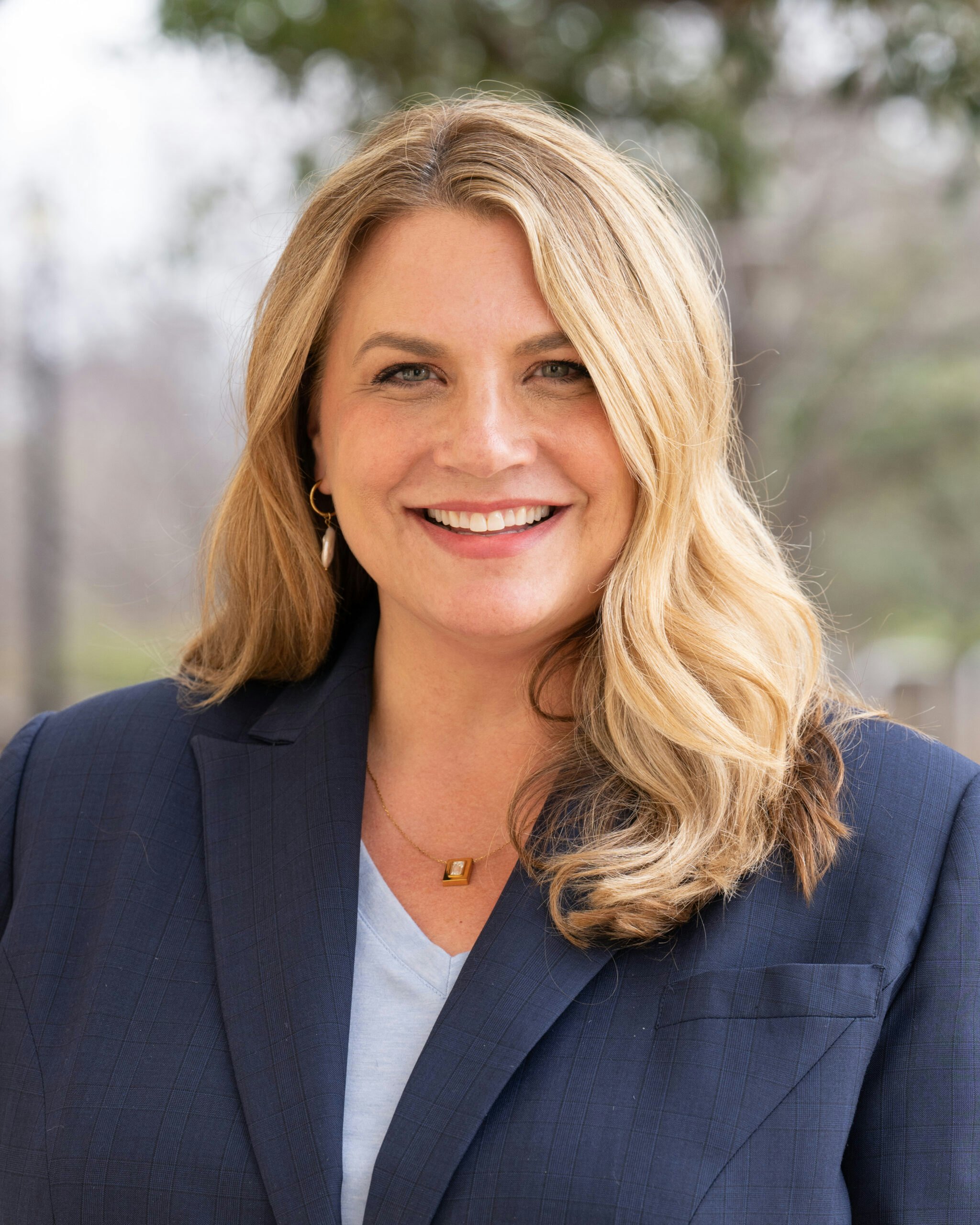Former New Mexico Secretary of Education Hanna Skandera shares a state leader’s perspective on accountability.
The “A” Word
Accountability simply means accepting responsibility for one’s actions. Accountability applied to schools, however, has become so polarizing that it is now the equivalent to a dirty word.
How did we get here? As with all polarizing issues, the truth requires us to look beyond the sound bites. THE “A” WORD seeks to do that through conversations with recognized education leaders.
Hanna Skandera brings the perspectives of a state chief, federal policymaker, and education researcher to The A Word. She served as the New Mexico secretary of education from 2010 to 2017, where she was heralded for lifting student scores. She was also a deputy education commissioner in Florida, a senior policy advisor in the U.S. Department of Education during President George W. Bush’s administration, and an education research fellow at Stanford University’s Hoover Institution. She serves the chair of the George W. Bush Institute’s Education Reform Advisory Council.
In this A Word conversation, which was conducted shortly before she left New Mexico, Skandera explains not only how she has used the principles of accountability in her various roles – but also how she would improve upon them. Two ideas stand out on that list. She supports empowering schools and districts to intervene more quickly to help students stay on track in reading and math. Second, she believes that accountability must be explained in ways that parents can understand and find meaningful. As she says, parents don’t throw around education buzzwords like “proficiency.” They want to know one simple thing: Is my child being set up for success?
How do you define accountability, and has that changed over time for you?
Accountability is both a simple and big word and at times can be very controversial. But too often we get wrapped up in the politics of the word when it’s really about making sure we have the necessary information to meet the needs of our kids and set them up for success.
Over the last several decades, there has been a heavy focus on accountability but that doesn’t frame the entire picture. In order to ensure we are best serving our students, we must partner accountability with support. As we measure our students, teachers, and schools, we should also make sure we are helping them in areas where they are struggling and then not forgetting to champion their successes as well.
In order to ensure we are best serving our students, we must partner accountability with support. As we measure our students, teachers, and schools, we should also make sure we are helping them in areas where they are struggling and then not forgetting to champion their successes as well.
As a state leader, how have you used the principles of accountability?
The first question we should ask as educators is: How well are we serving our students? We need to ensure that when a child finishes out the school year, they are fully prepared to move on to the next grade. As a state leader, I understood the important role that accountability played in making that happen. We needed to start with setting clear expectations and then measure which students were closing achievement gaps and which students were not on grade level.
We knew we needed to create robust opportunities to measure student outcomes. In fact, my state has ranked fourth in the nation for being a truth teller and closing honesty gaps. Knowing where our kids stand has allowed us to raise the bar so that our high school diploma actually means something.
Knowing where our kids stand has allowed us to raise the bar so that our high school diploma actually means something.
What do you mean when you say you want your diplomas to mean something?
When I arrived in New Mexico, I learned that our high school diploma was at the eighth-grade equivalent and nearly half of our kids entering college still needed remediation. That was completely unacceptable. We knew that we needed to raise that bar so that when our students walked across that stage, it genuinely meant they’re ready for college and career.
We did that by making sure our students are demonstrating competency, on grade level, in key content areas — English, language arts, math, science, social studies and history. Then, we provided the support to help our kids get there. It’s been incredible to see our students rise to the challenge as the bar has been raised. One example is that our graduation rate grew eight percentage points in the last six years.
An honesty gap is an interesting way to talk about transparency. How important was that in bringing attention to deficits?
Accountability really started in New Mexico when Governor Susana Martinez took office in 2011. It was important for us to first establish high expectations and change the game. That allowed us to create a sense of urgency.
When I first arrived in New Mexico, many people would tell me our kids didn’t have a chance at succeeding because they came from tough backgrounds. But we refused to believe that demographics equal destiny.
Over the years – as we placed education at the center of every conversation, closed the honesty gap, and raised the bar – we created a culture shift in pointing out the gaps and the possibilities for our kids. We have reignited the belief that every child can learn and be set up for success.
Our kids are just as special as everyone else’s. They are just as unique, just as capable of being successful.
What’s limited your ability to implement accountability?
We have an institutionalized status quo that is holding on to what is, instead of believing what’s possible for our kids. The biggest pushback has come from there. That is unfortunate, but there’s been a slow rumble over the last six years that has grown to a happy thunder around the belief that we are going to own success for our kids.
What do you mean by an “institutionalized status quo”?
The year I came in, 99 percent of our schools were failing under No Child Left Behind and people just disregarded accountability. According to our old teacher evaluation, 99 percent of our teachers “met competency.” There was no differentiation; all were the same. It was uncomfortable for folks to be told they need to improve. In a system like that, there is no way to know how to support those who need to improve or how to raise up leaders who are knocking it out of the park.
The year I came in, 99 percent of our schools were failing in No Child Left Behind and people just disregarded accountability.
The same is true with our students. Not knowing how they are doing is like living in a bubble and goes against believing that our kids should be prepared for success in their lives.
In our state, the status quo has consistently been led by our union. I always say I am not anti-union until they don’t put kids first. Unfortunately, my experience in New Mexico is that they’ve placed the interests of adults ahead of what’s right for our children.
You could say that’s the union’s job. But the problem is when that membership becomes the number one stakeholder, you get a tug-of-war between the comfort zones of the adults versus the success of our kids.
I always say I am not anti-union until they don’t put kids first. Unfortunately, my experience in New Mexico is that they’ve placed the interests of adults ahead of what’s right for our children.
What was the opposition like when you were pushing higher expectations for high school graduation?
I want to be really clear. Our business and higher education leaders knew full well that kids were coming to them not prepared. I consistently heard from community leaders that kids were graduating high school not prepared with basic skills. They lacked the critical thinking skills to be a part of the workforce.
The data tells the story. You’ve got a big gap when 50 percent of your kids need to redo high school instead of being prepared for college.
There are definitely leaders who have fought for a new paradigm to deliver on the promises we make in education. On the flip side, there are those who have not. Legislative committees, for example, get funding for their election from people opposed to change or who march at their offices. The sheer opposition to change makes it harder.
There’s a bit of a human nature piece in this. It’s uncomfortable to go through a big change, especially when you are used to doing things in a certain way. It is absolutely uncomfortable and hard.
We certainly experienced a lot of pushback. It took me four years to be confirmed – and not because our confirmation process was busy.
Where have we gone wrong in building support for accountability? What would help us do it better now?
Remember when I said accountability is really a simple word? Sometimes we use big words when we need to just be clear about what matters. I am a culprit of forgetting this, so I say this humbly.
Accountability is about learning how to best serve our children.
We have accountability so that we can take action in supporting students, teachers, and schools. We do this so we can close achievement gaps and champion those that are doing well.
About three years ago, we launched Principals Pursuing Excellence in New Mexico with the sole intent of helping educators close the achievement gap. The program matches schools that are closing achievement gaps above the state average with those that are struggling to close gaps. The program is rigorous, but those who have participated, which is about 10 percent of our schools, doubled and tripled their improvement.
The school leader is so important, and we can never underestimate that, but we have not changed the leaders in the struggling schools. Instead, we have changed their paradigm. We’ve equipped them and given them the opportunity to close achievement gaps by learning from peers.
As a result, we recently launched Teachers Pursuing Excellence — a mentoring program for and by teachers. It’s rigorous. You can get kicked out if you’re not interested in owning the challenge, but we’re seeing tremendous results.
We have a long way to go, but this partnership is about knowing where you stand so that you can do something about it. We often have focused only on knowing where we stand and forgotten that we’ve got to equip folks to lead and deliver on the promise on the other side of the data that accountability systems produce.
What would your perfect accountability system look like now that states have increased authority under the Every Student Succeeds Act [ESSA]? What do you worry about in terms of creating that perfect system?
New Mexico is fortunate. We worked with higher education leaders to raise our standards, adopt new assessments to measure those standards, create a meaningful diploma, develop meaningful school accountability, and implement a new teacher evaluation system.
We firmly believe in capturing the growth of students and their proficiency in subjects at grade level. At the high school level, for example, we capture graduation rates as well as use metrics that capture the growth in the number of students ready for college or a career.
On the career-readiness side, it’s not just about taking a career technical-education course; that course has to be aligned to a pathway to get you a certificate as you graduate. We not only measure whether someone is participating in AP classes, dual credit, and career courses, but we actually want to make sure students are getting those certificates and passing those courses with high scores.
To me, the next step in our high school accountability system is including remediation rates. We need to know how well prepared our students are once they get to college. In fact, in two years, we will include college remediation rates linked back to student’s high school of record into the school grade.
In addition, with the new ESSA law, we also will be adding English language proficiency and science as components of our school accountability system. We already include teacher, student, and parent surveys, as well as parent engagement.
How do you make this data, as well as your accountability system, understandable to parents, school board members, and the media?
One of the early mistakes we made was always talking about “the system.” Most of the time a parent doesn’t walk in and ask, “What’s the level of growth in so-and-so grade? And what about that proficiency?” They ask one seminal question: “Are you serving my child, and are they set up for success?”
Most of the time a parent doesn’t walk in and ask, ‘What’s the level of growth in so-and-so grade? And what about that proficiency?’ They ask one seminal question: ‘Are you serving my child, and are they set up for success?’
We have done focus groups with both English-speaking parents and Spanish-speaking parents, asking “what do you really want to know?” The school’s grade answered almost all the questions they wanted to know, but we realized we did a terrible job translating it into meaningful information for them.
Many times we talk about X percent of students being proficient across the state. If I’m a parent, that may or may not matter. They mostly want to know whether their child is on grade level.
We have started working hard on this. Teachers are the number one communicator to parents, so we’ve got to be equipping them with meaningful information for parents.
It’s also how we talk about success. For us, looking from last year to this year, 15,000 more kids went to school on grade level in English, language arts, and math. If you are a parent dropping your child off at school every day, there is confidence and excitement knowing you’re taking your child to school and they’re ready to learn at that grade, in that subject, and they weren’t a year before.
What do you tell parents about whether this achievement gap may be solvable or what it will take to solve it?
There are lots of strategies and teaching methods, but number one is great teachers. Research shows an effective teacher is able to close the achievement gap in two-to-three years. And correspondingly, that gap widens when we don’t have great teachers in classrooms.
This is why the conversation around teachers is so important. Holding our teachers accountable is not about a punitive system that makes people feel bad. It’s about making sure all teachers are set up for success when teaching our children.
Holding our teachers accountable is not about a punitive system that makes people feel bad. It’s about making sure all teachers are set up for success when teaching our children.
The biggest issue in our state is communication. We have made a huge effort in the last two years to reach our teachers. I made a terrible assumption when I started that if I tell superintendents, superintendents will tell principals, principals will tell teachers, and teachers will tell parents. That is not the case, and that’s not to point fingers. By the time the message gets to parents, we’ve definitely slaughtered it, and that’s if you actually believe in the message.
If you don’t like the message, you deliver your own message. So, we’ve made a huge effort to now communicate directly with teachers — to equip, empower and champion teacher voice and impact.
Our goal is to have a teacher in every single school with a direct pipeline to us at the Public Education Department, giving us feedback and information. At the same time, we have a direct pipeline to them, and they’re committed and have the responsibility as a teacher-leader to share the information they receive.
I made a terrible assumption when I started that if I tell superintendents, superintendents will tell principals, principals will tell teachers, and teachers will tell parents. That is not the case, and that’s not to point fingers. By the time the message gets to parents, we’ve definitely slaughtered it, and that’s if you actually believe in the message.
What uncomfortable truth have we been unwilling to address in education?
Two or three things come to mind, although it’s probably several in all candor. We have not shifted our paradigm to a 21st century mindset, which means we have all these archaic systems that reward all the wrong things. They establish what’s important in all the wrong ways.
Let me give some examples. We have not successfully changed how we pay teachers. We do have a pay-for-performance pilot in New Mexico that is based on a teacher’s effectiveness. But, as a general rule, we have not successfully changed the paradigm about how we pay. At this point, pay it is still based on how long you’ve been in the system and your credentials, even though there’s no evidence that more time in the classroom determines success and excellence.
Teacher preparation is another example. No disrespect to our professors, but professors are too often teaching old pedagogical approaches instead of exploring new up-to-date approaches and providing candidates with more time in the classroom prior to actually becoming a licensed teacher.
We also have a school year that’s based on the agrarian model. And we have a whole system of seat time versus competency-based learning.
These are four or five examples of how we have systems that are outdated. We’ve got to address those systems so we truly put today’s kids first in every decision to help drive them towards success.
We have not shifted our paradigm to a 21st century mindset, which means we have all these archaic systems that reward all the wrong things. They establish what’s important in all the wrong ways.
What’s at stake for us as a country to get this discussion right? What’s at stake for New Mexico?
What’s at stake for New Mexico is our state’s future. We have chronically been at the bottom when it comes to economic and educational outcomes. If we want economics to change, educational outcomes have to change.
We’re making progress, but we have work to do. We’ve reached a tipping point. What matters most is believing that all kids can learn and then never giving up until we deliver on that promise for every single child.
If we do deliver on that promise, our educational outcomes will continue to rise as will our economy and the future of our state. And it’s really no different for the country. We need to address the failed systems, and create systems that acknowledge students and parents are stakeholders. If we don’t do this, we fail the kids.
We need to be tough on accountability but marry it with equipping and championing those who deliver education to our kids. Otherwise, we miss an opportunity. It can be done, but it is no easy task.
more from the A Word
Read more interviews from education leaders who have embraced accountability as a way to change outcomes.
The “A” Word: Accountability — The Dirty Word of Today’s Education Reform


























